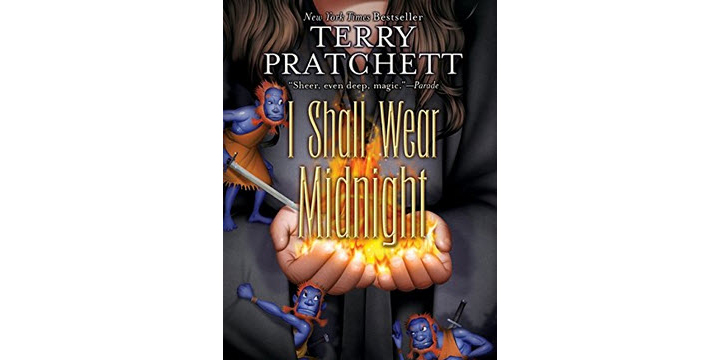Some Tiffany Aching fans may be a little miffed by my title. They shouldn’t be. I am completely won over by Tiffany Aching. I have only just discovered Terry Pratchett. I have seen the movie adaptation of
The Hogfather and I have read Guards! Guards! Oh, yes, I have also read Good Omens that Pratchett co-wrote with Neil Gaiman. I experienced these in stand-alone mode over several years and never connected the name Pratchett to them. Now, as I close I Shall Wear Midnight, Terry Pratchett has my attention.
I came to I Shall Wear Midnight having no idea who Tiffany Aching was or what her world was like. My first impression of Tiffany, after a few chapters, was that she was nothing much more than a certified nursing assistant on steroids. This isn’t a put down. The fact that Pratchett took a witch—a very real witch—and has her washing dishes, delivering babies, and taking care of toe nails struck me as quite original and rich.
Even so, I didn’t fully appreciate Tiffany Aching until the scene in the barn when she is trying to convince Mr. Petty to leave before the villagers come and kill him for beating his daughter near to death. In the face of his drunken belligerence Tiffany rose up as something much larger—much fiercer—than the sixteen-year-old girl that she is. She does not rely on magical powers as she faces down a man who could kill her with one punch. Instead, she summon an authority tied to her office as a witch (she is, after all, the Hag of the Hills) which gives her the right and confidence to tell this man what he should do, “Leave, Mr. Petty. Run.” She does so with all the intimidation of a drill sergeant who is in a trainee’s face, but with a quietness that is as ominous as approaching black clouds. She does use a bit of magic in this scene, but only in self-defense. When he attacks her she transfer the pain of his daughter to him. The self-restraint of Tiffany—the self-restraint of the author—is inspirational.
What ultimately made me give my heart to Tiffany was why she was trying to convince Mr. Petty to leave. Mr. Petty was a miserable brute of a human being who deserved what was coming to him. Tiffany makes that very clear. It was the villagers she was trying to save—they didn’t deserve to commit an atrocity, even against a man like Mr. Petty. It is rare that I ever read an author who can conjure up such sincere, meaningful humanity in a novel. Tiffany Aching carries herself with the grace and confidence of a queen, has the power of a witch, and yet her first purpose in each day is to serve and care for the people she is bound to. What the world would be like if we all knew someone like Tiffany Aching.
I’m not sure if others are drawn into books for the reasons I am, but I Shall Wear Midnight has all the usual draws, too. The characters live and breathe and are delightful. The world is colorful, vivid, and worth some of the precious time of your life to visit. A review by Booklist says, “The action never picks up much more momentum than a determined amble,” which is true. The battle with the Cunning Man seems almost anticlimactic for all the fear I felt leading up to it. In a lesser book this would have been a major flaw. In I Shall Wear Midnight it isn’t a flaw at all. This is because the plot (which is a very good plot, indeed) is secondary to joy of meeting the characters and listening to the delightful dialogues they have. All I can say is, I shall read more Terry Pratchett.

